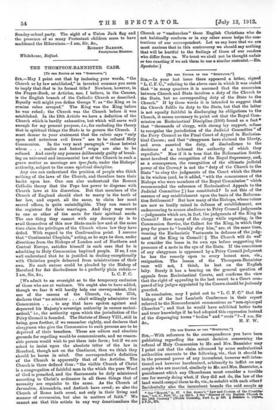[To vim EDITOR Or THE "SPECTATOR. "] SIR, In your last
issue there appeared a letter, signed " L. C. F. C.," relating to the above case in which it was stated that "in many quarters it is assumed that the connexion between Church and State involves a duty of the Church to the State, but no corresponding duty of the State to the
Church." If by these words it is intended to suggest that
the Church fulfils its duty to the State, but that the latter is not equally faithful in discharging its obligations to the Church, it seems necessary to point out that the Royal Cora- mission on Ecclesiastical Discipline (1906) found as a fact* that "thousands of clergy, with strong lay support, refuse to recognize the jurisdiction of the Judicial Committee " of the Privy Council as the Final Court of Appeal in Ecclesias- tical Causes ; and that "clergymen have claimed the liberty, and even asserted the duty, of disobedience to the decisions of a tribunal the authority of which they repudiate." Now if it is true that the Reformation Settle- ment involved the recognition of the Royal Supremacy, and, as a consequence, the recognition of the ultimate judicial power of the Crowiat is not the " duty of the Church to the State " to obey the judgments of the Court which the State in its wisdom (and, be it added, "with the concurrence of the Bishops who were members of the Royal Commission" which recommended the reference of Ecclesiastical Appeals to the Judicial Committee ) has constituted ? Is not this of the essence of any establishment upon the basis of the Reforma- tion Settlement ? But how many of the Bishops, whose voices are now so loudly raised in defence of establishment, are endeavouring to secure obedience to Privy Council judgments —judgments which are, in fact, the judgments of the King in Council ? How many of the clergy while repeating, in the Communion Service, the Collect for the King, in which they pray for grace to "humbly obey him," are, at the same time, wearing the Eucharistic Vestments in defiance of the judg- ment of the King in Council! § The Church will do wet' to consider the beam in its own eye before suggesting the presence of a mote in the eye of the State. If the conscience of any clergyman is oppressed by a Privy Council judgment
he has the remedy open to every honest man, viz., resignation. The lesson of the Thompson-Bannister case will not I think, be lost on the English laity. Surely it has a bearing on the general question of appeals from Ecclesiastical Courts, and confirms the view that the right of appealing in the last resort to a Court coin, posed of lay judges appointed by the Crown should be jealously guarded.
In conclusion, may I point out to " L. C. F. C." that the bishops of the last Lambeth Conference in their report referred to the Nonconformist communions as "non-episcopal Churches"; and that he would have exhibited better taste and truer knowledge if he had adopted this expression instead of the disparaging terms " bodies " and " sects "?—I am, Sir






































 Previous page
Previous page